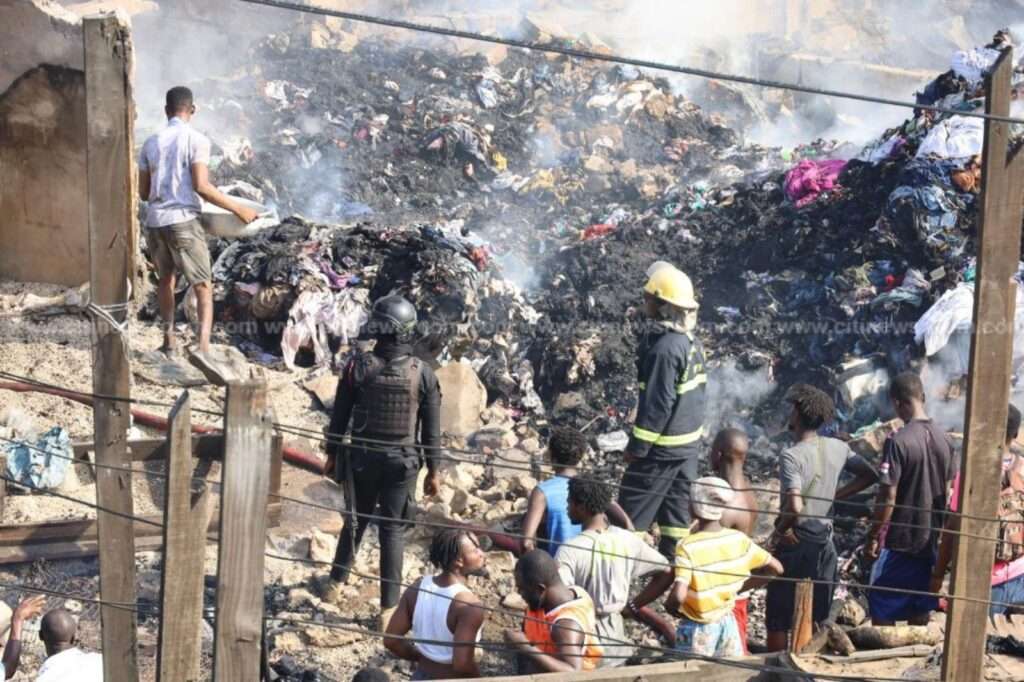The recurring fires at Kantamanto and other markets in Ghana highlight systemic failures in governance and societal responsibility.
Poor urban planning, inadequate fire prevention infrastructure, and weak enforcement of safety regulations reflect a lack of proactive leadership.
Accordingly, Prof. Stephen Kwaku Asare, Democracy and Development Fellow at CDD-Ghana has described the Kantamanto fire outbreak, which devastated numerous businesses, as a stark reminder of Ghanaians’ collective failure.
He highlighted the lack of fire insurance, which has left affected traders without any safety net, deepening their vulnerability.
According to Prof. Asare, this disaster has also worsened the already critical unemployment situation, with hundreds, if not thousands, suddenly out of work.
“With prior experience at Okaishie and Makola, I understand that their stalls were not just places of business; they were lifelines. The goods reduced to ashes were more than inventory; they were investments, aspirations, and security for the future.
“To lose everything in a single morning is a devastation that words cannot fully capture. For many, this fire does not just mean the loss of property. It means the loss of dignity. It means telling a child there is no money for school fees, or facing eviction because the rent cannot be paid. These are not just numbers or statistics; these are real human stories of pain and loss”.
Prof. Stephen Kwaku Asare
He further pointed out that the delayed response by the fire service has reignited concerns about preparedness and capacity.
He questioned whether the equipment and resources were sufficient and whether the fire hydrants were operational, noting that these recurring issues, left unaddressed after every major fire, reflect systemic neglect that exacerbates the struggles of those already on the margins of society.
Prof. Asare emphasized the need to support the traders of Kantamanto not only in spirit but through tangible actions.

He commended their courage to rebuild after past fires, describing their resilience as a testament to the strength within Ghanaian communities.
However, he stressed that they should not face the burden of rebuilding alone or endure such tragedies repeatedly.
He further observed that past fires at Kantamanto have taught the nation little.
Prof. Asare lamented that illegal electrical connections persist, exposed wiring is left unattended, building codes are ignored, and market inspections are infrequent and poorly enforced.
This ongoing negligence underscores the systemic failures that perpetuate such disasters.
Prof. Asare Calls for Action to Address Root Causes of Market Fires
Prof. Stephen Kwaku Asare further emphasized that genuine empathy for the traders must be reflected in concrete actions, pointing out that simply offering condolences or pledging support after the fact is insufficient.
He called for confronting the root causes of these disasters—issues that are well-known but consistently ignored.
He stressed that it is the nation’s responsibility to ensure such tragedies are not repeated. Fire preparedness and prevention, he argued, must be elevated to national priorities.

“Regular checks for electrical safety and compliance with building codes must be mandatory. The fire service must be equipped with the tools, training, and infrastructure needed to respond quickly and effectively.
“Traders must be educated on fire safety and encouraged to invest in affordable fire insurance tailored to their needs. Local governments and market associations must work together to develop comprehensive fire prevention plans”.
Prof. Stephen Kwaku Asare
Prof. Asare urged Ghanaians to stand with the people of Kantamanto, not just in solidarity but through meaningful action.
He called the fire a painful reminder of what is at stake, emphasizing the need for real change to prevent future tragedies.
Their resilience, he said, demands more than admiration—it demands a commitment to do better for them and the nation’s future.
Meanwhile, successive governments have failed to prioritize the modernization of markets, while society often neglects collective accountability for safety practices.
The situation underscores a broader issue: the tendency to react to crises rather than implement sustainable preventive measures.
Without decisive action, these tragedies will continue to expose the nation’s vulnerabilities.
READ ALSO: Muan International Airport Raided By Police



















